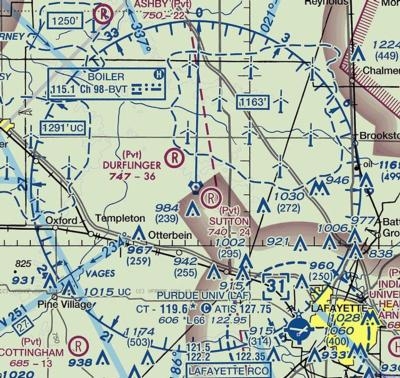Fri, Aug 12, 2016
Cites Increase In RNAV Routes Coming Online In The NAS As Reason For The Action
The FAA has issued a policy statement on its proposed reduction of VORs in the U.S.

The document outlines the selection criteria for VORs that may be shut down as part of the VOR MON (Minimal Operational Network) Implementation Program and United States (U.S.) National Airspace System (NAS) Efficient Streamline Services Initiative.
In 2011, the FAA announced that, as part of a NAS Efficient Streamlined Services Initiative, the number of conventional NAVAIDs would be reduced while more efficient Area Navigation (RNAV) routes and procedures are implemented throughout the NAS. The FAA noted its intention to convene a working group to assist in developing a candidate list of VORs for discontinuance using relevant operational, safety, cost, and economic criteria. Interested parties were invited to participate in the review of this policy and planning effort by submitting written comments on the proposal. The agency reviewed all 330 comments it received to its proposal.
The following criteria were used by the FAA to determine which VORs would be retained as a part of the MON:
- Retain VORs to perform Instrument Landing System (ILS), Localizer (LOC), or VOR approaches supporting MON airports at suitable destinations within 100 NM of any location within the CONUS. Selected approaches would not require Automatic Direction Finder (ADF), Distance Measuring Equipment (DME), Radar, or GPS.
- Retain VORs to support international oceanic arrival routes.
- Retain VORs to provide coverage at and above 5,000 ft AGL.
- Retain most VORs in the Western U.S. Mountainous Area (WUSMA), specifically those anchoring Victor airways through high elevation terrain.
- Retain VORs required for military use.
- VORs outside of the CONUS were not considered for discontinuance under the VOR MON Implementation Program.
- The following considerations were used to supplement the VOR MON criteria above:
- Only FAA owned/operated VORs were considered for discontinuance.
- Co-located DME and Tactical Air Navigation (TACAN) systems will generally be retained when the VOR service is terminated.
- Co-located communication services relocated or reconfigured to continue transmitting their services.
The FAA says in the document that it remains committed to the plan to retain an optimized network of VOR NAVAIDs. The MON will enable pilots to revert from Performance Based Navigation (PBN) to conventional navigation for approach, terminal and en route operations in the event of a GPS outage and supports the NAS transition from VOR-based routes to a more efficient PBN structure consistent with NextGen goals and the NAS Efficient Streamlined Services Initiative.
More News
He Attempted To Restart The Engine Three Times. On The Third Restart Attempt, He Noticed That Flames Were Coming Out From The Right Wing Near The Fuel Cap Analysis: The pilot repor>[...]
Make Sure You NEVER Miss A New Story From Aero-News Network Do you ever feel like you never see posts from a certain person or page on Facebook or Instagram? Here’s how you c>[...]
From 2009 (YouTube Edition): Leading Air Show Performers Give Their Best Advice for Newcomers On December 6th through December 9th, the Paris Las Vegas Hotel hosted over 1,500 air >[...]
Aero Linx: NASA ASRS ASRS captures confidential reports, analyzes the resulting aviation safety data, and disseminates vital information to the aviation community. The ASRS is an i>[...]
“For our inaugural Pylon Racing Seminar in Roswell, we were thrilled to certify 60 pilots across our six closed-course pylon race classes. Not only did this year’s PRS >[...]
 NTSB Final Report: Rutan Long-EZ
NTSB Final Report: Rutan Long-EZ ANN FAQ: Turn On Post Notifications
ANN FAQ: Turn On Post Notifications Classic Aero-TV: ICAS Perspectives - Advice for New Air Show Performers
Classic Aero-TV: ICAS Perspectives - Advice for New Air Show Performers ANN's Daily Aero-Linx (06.28.25)
ANN's Daily Aero-Linx (06.28.25) Aero-News: Quote of the Day (06.28.25)
Aero-News: Quote of the Day (06.28.25)



